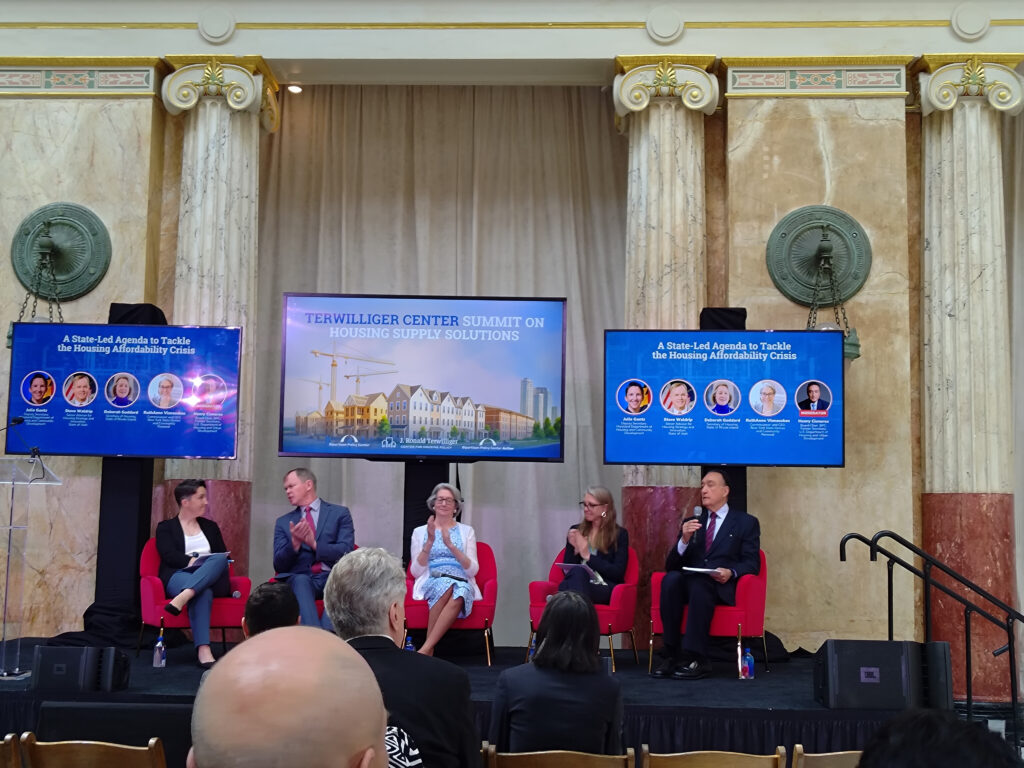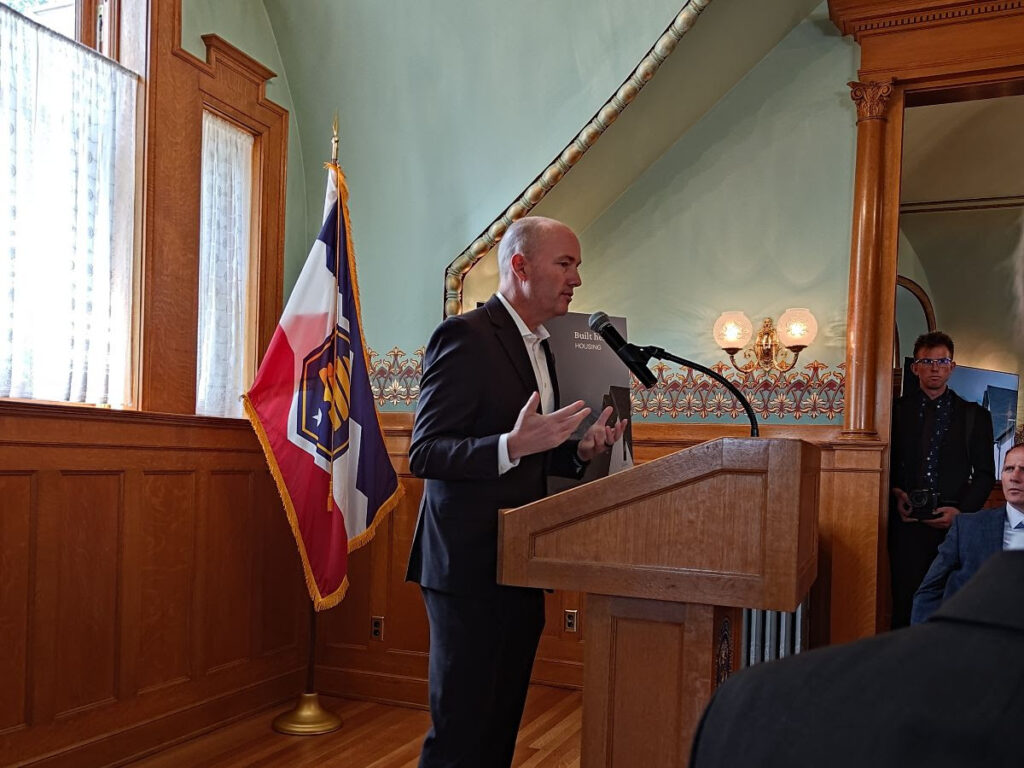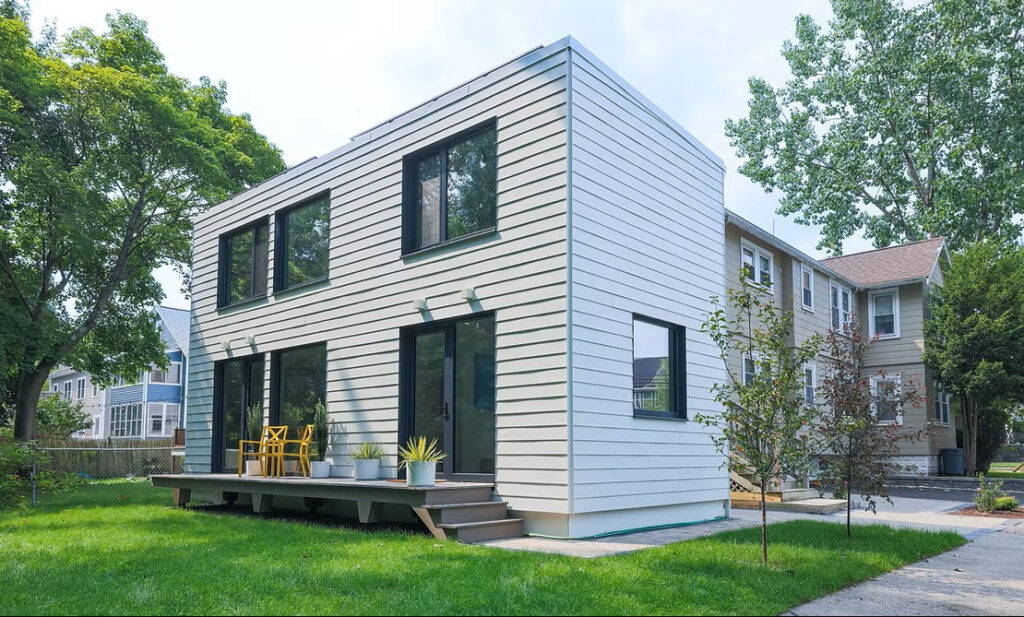National Housing Crisis Task Force: Updates from the Road

- Resources
As the National Housing Crisis Task Force prepares to launch the full State and Local Housing Action Plan later this month, we’ve been traveling the country to engage with colleagues and partners to help advance housing production locally and nationally.
On Wednesday, May 28, the Task Force partnered with Up For Growth to convene a regional pro-housing forum in Phoenix. Over 75 policymakers, business leaders, and housing advocates joined the forum to discuss the housing shortages impacting the state and potential strategies for boosting housing supply and affordability.
 From left to right: Mayor Corey Woods of Tempe, AZ; former Mayor John Giles of Mesa, AZ; David Garcia, Policy Director for Up for Growth; and National Housing Crisis Task Force Director Ben Preis
From left to right: Mayor Corey Woods of Tempe, AZ; former Mayor John Giles of Mesa, AZ; David Garcia, Policy Director for Up for Growth; and National Housing Crisis Task Force Director Ben Preis
The forum featured a panel with Mayor Corey Woods of Tempe, AZ and former Mayor John Giles of Mesa, AZ moderated by Task Force Director Ben Preis. The Mayors discussed the greatest housing challenges facing America’s cities, including homelessness, NIMBY-ism, and lack of affordable housing, as well as the need for bipartisanship and regional solutions to address the crisis. Mayor Woods highlighted his city’s successful Hometown for All initiative, which dedicates 50% of the permitting fees paid by local housing developers to building affordable and workforce housing. Mayor Giles emphasized the importance of local collaboration, stating “Cities are not the enemy on this issue.” These policy initiatives also align with recent successes in Phoenix; under the leadership of Mayor Kate Gallego, who also co-chairs the Task Force’s Mayoral Implementation, the city recently achieved its goal of building 50,000 new housing units by 2030 – five years early.
Later that week, Preis joined a convening of local elected officials and state policymakers in Utah hosted by Gov. Spencer Cox, who is one of the Task Force’s Co-Chairs. Gov. Cox discussed the importance of homeownership for wealth creation and the critical need to invest in housing for younger families. A group of local electeds, including Mayor Mike Mendenhall of Spanish Fork, Mayor Mark Shepherd of Clearfield City, and Mayor Lorin Palmer of Herriman City, discussed the disconnect between strong job growth in their communities and a lack of housing supply growth, leading to inflated home prices.
 Utah Gov. Spencer Cox addresses the convening of local and state policymakers.
Utah Gov. Spencer Cox addresses the convening of local and state policymakers.
They also discussed the need for more programs like the state’s Station Area Plans initiative, which provides technical assistance and funding to local communities that rezone to allow for the construction of additional housing near transit stations.
On June 13, Preis also joined the 2025 Financial Innovations Roundtable at the Federal Reserve Bank of New York. Organized by the Center for Impact Finance at the University of New Hampshire, this year’s financial innovations roundtable focused on naturally occurring affordable housing, with panelists from across the country focusing on private capital solutions, innovative policy and practice, and public-sector partnerships to produce and preserve affordable housing without federal subsidy. The team at the Center for Impact Finance will be releasing a report following the event later this summer.
Preis concluded his recent tour today, June 18, at the Bipartisan Policy Center’s 2025 Terwilliger Center Summit on Housing Supply Solutions. Housing experts, policymakers, and community leaders gathered at the event in Washington, D.C. to discuss bipartisan solutions to the nation’s acute shortage of affordable homes. Task Force members former HUD Secretary Henry Cisneros and RuthAnne Visnauskas, Commissioner and CEO of New York State Homes and Community Renewal, joined Steve Waldrip, Senior Advisor for Housing Strategy and Innovation to Gov. Cox, and others on a panel about state-led agendas to tackle the housing crisis.
Waldrip noted that housing has undergone a “seismic shift” in even just the last five years with housing affordability declining precipitously and cited examples of initiatives Utah is undertaking to combat rising housing prices and lack of available housing. Through a new fund created by the state legislature, the state was able to provide low-cost financing to a developer to build 1,000 detached single-family homes that will sell for under $400,000, well below the median price of new homes in the state of $535,000. Reduced lot sizes also allowed the developer to add 275 new units to the original project scope, a 40% increase in density.
The Summit concluded with remarks from HUD Secretary Scott Turner who spoke about the Trump Administration’s focus on increasing access to homeownership. He cited the continuation of Opportunity Zones and manufactured housing as two innovations that can help drive housing affordability and production.
And the Award goes to …
The Task Force applauds the recently announced winners of the 2025 Ivory Prize for Housing Affordability: Grounded Solutions, Reframe Systems, and Live Local. Launched in 2019, the Ivory Prize is awarded annually by Ivory Innovations, a nonprofit academic center based at the University of Utah David Eccles School of Business. Ivory Innovations works to source, support, and scale the most compelling housing innovations to advance housing affordability.
 An affordable accessory dwelling unit built by Reframe Systems in Massachusetts
An affordable accessory dwelling unit built by Reframe Systems in Massachusetts
Past winners of the Ivory Prize include Task Force member Montgomery County Housing Opportunity Commission for their housing production fund and Mayors Implementation Committee member San Diego for their ADU policies. Selected from a record-breaking pool of over 280 nominations, this year’s winners represent bold leadership in the categories of finance, construction & design, and policy and highlight potential implementation pathways for many of the same issues that the Task Force has discussed in its own work. Each organization brings a unique, scalable approach to tackling the housing crisis and will share $300,000 in prize funding to accelerate their impact.
Coming soon!
The Task Force plans to release the full set of tools from its State and Local Housing Action Plan at the end of June. You can view previously released sets of tools here. Stay tuned for more updates as we head into the Task Force’s second year.

